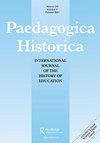一个神秘的成功:20世纪50年代的斯波克博士和荷兰。
IF 0.3
4区 教育学
Q4 EDUCATION & EDUCATIONAL RESEARCH
引用次数: 5
摘要
本文章由计算机程序翻译,如有差异,请以英文原文为准。
A mysterious success: Doctor Spock and the Netherlands in the 1950s.
This article examines the success of Doctor Benjamin Spock's best selling “The Common Sense Book of Baby and Child Care” (1946). It focuses on the case of the Netherlands during the 1950s. As in the United States, the book immediately became extremely popular after the first Dutch edition was published in 1950. In this case, however, the doctor's success was not at all likely, as conditions that are commonly held responsible were absent. First, the authors discuss the explanations of Spock's popularity in the United States. His book is generally considered an expression of the developing consumerism of the booming American post‐war economy. Secondly, an outline of economic, demographic, social and cultural developments in the Netherlands during the 1950 s shows that arguments relating to economic prosperity do not hold true for the Dutch case. The post‐war years were an era of poverty, scarcity, frugality, order, strictly hierarchical relationships, and a strong influence of religious doctrines on family life. Thirdly, as these conditions did not match with the doctor's secular, fun‐oriented, and allegedly permissive child‐rearing ideal, his advice is compared with Dutch family manuals of the post‐war years. The main difference appears to be Spock's much more positive and optimistic approach to parenting. For Dutch experts parenthood was loaded with difficulties, risks and responsibilities, whereas Spock presented it first of all as a source of pleasure. Therefore, the authors draw the conclusion that young Dutch parents must have felt attracted to an approach to child rearing they could associate with prosperity and success.
求助全文
通过发布文献求助,成功后即可免费获取论文全文。
去求助
来源期刊

PAEDAGOGICA HISTORICA
Multiple-
CiteScore
0.90
自引率
40.00%
发文量
72
期刊介绍:
"Paedagogica Historica is undoubtedly the leading journal in the field. In contrast to a series of national journals for the history of education, Paedagogica Historica is the most international one." A trilingual journal with European roots, Paedagogica Historica discusses global education issues from an historical perspective. Topics include: •Childhood and Youth •Comparative and International Education •Cultural and social policy •Curriculum •Education reform •Historiography •Schooling •Teachers •Textbooks •Theory and Methodology •The urban and rural school environment •Women and gender issues in Education
 求助内容:
求助内容: 应助结果提醒方式:
应助结果提醒方式:


